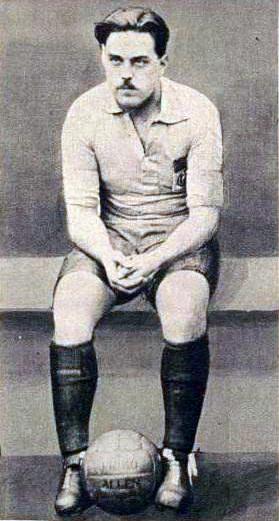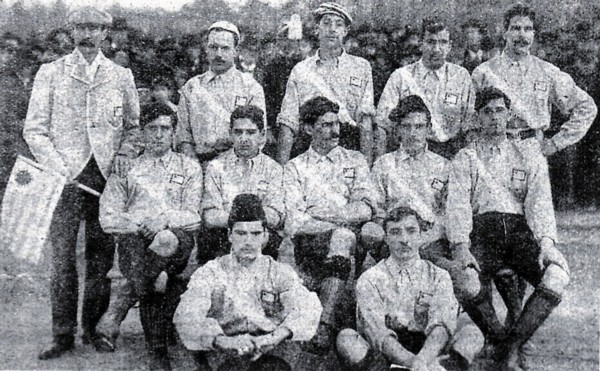|
Paul Nicolas
Paul Nicolas (4 November 1899 – 3 March 1959) was a French footballer who played as a striker. He was part of the France national football teams at the 1920, 1924, and 1928 Summer Olympics. He was also part of the France national football team selection committee. Club career Paul Nicolas lost his mother at the age of 3, and then his father in 1914. He was raised by his mother-in-law together with his brother Henri. He began his football career with Saint-Mandé Club in 1916. Initially, he played as a defender, but he quickly realized that his destiny laid at the forefront since he scored many goals. In addition to his goal-scoring instinct, Nicolas also stood out for his strong character on the pitch, and these two qualities combined eventually drew the attention of Mr. Fort, the then president of the Gallia Club, who signed him as a centre-forward in 1916. At the time, center-forwards usually were corpulent, aggressive and impetuous players, but Nicolas revolutionized ... [...More Info...] [...Related Items...] OR: [Wikipedia] [Google] [Baidu] |
Saint-Mandé
Saint-Mandé () is a high-end Communes of France, commune of the Val-de-Marne Departments of France, department in Île-de-France in the eastern suburbs of Paris, France. It is located from the Kilometre Zero, center of Paris. It is one of the smallest communes of the Île-de-France by land area, but is one of the most densely populated municipalities in Europe. It is located on the edge of the 12th arrondissement of Paris, near the Porte de Vincennes and the Porte de Saint-Mandé. The motto of the city is ''Cresco et Floresco'', which means "I grow and I flourish". History On 1 January 1860, the city of Paris was enlarged by annexing neighboring communes. On that occasion, about two-thirds of the commune of Saint-Mandé was annexed to Paris, and now forms the neighborhoods of Bel-Air (Paris), Bel-Air and Picpus, Paris, Picpus, in the 12th arrondissement of Paris. In 1929, the commune of Saint-Mandé lost one-quarter of its territory when the city of Paris annexed the Bois de Vin ... [...More Info...] [...Related Items...] OR: [Wikipedia] [Google] [Baidu] |
Lucien Gamblin
Lucien "Lulu" Gamblin (22 July 1890 – 30 August 1972) was a French international footballer played as a midfielder. He spent his entire career playing for Red Star FC and captained the team to three straight Coupe de France titles from 1921–1923. Gamblin was also a France international and made his debut with the team on 23 April 1911 in a 5–2 defeat to Switzerland. His international career was put on hold due to World War I. Following the war's conclusion, Gamblin captained the team in his final nine appearances. After retiring from football in 1923, he became a sports journalist working for such newspapers as L'Auto and France Football ''France Football'' is a French weekly magazine containing football news from all over the world. It is considered to be one of the most reputable sports publications in Europe, mostly because of its photographic reports, in-depth and exclusiv .... References 1890 births 1972 deaths Association football midfielders French ... [...More Info...] [...Related Items...] OR: [Wikipedia] [Google] [Baidu] |
Uruguay National Football Team
The Uruguay national football team ( es, Selección de fútbol de Uruguay) represents Uruguay in international Association football, football, and is controlled by the Uruguayan Football Association, the governing body for football in Uruguay. The Uruguayan team is commonly referred to as ''La Celeste'' (The Sky Blue). Regarded to be one of the greatest footballing nations of all time, Uruguay has won the Copa América 15 times being tied with Argentina for the most titles in the history of the tournament. Uruguay won their most recent title in 2011 Copa América, 2011. Additionally, Uruguay are the holders of Four stars above Uruguay's football crest, four FIFA World Championships: The team has won the FIFA World Cup twice, including the first World Cup in 1930 FIFA World Cup, 1930 as hosts, defeating Argentina 4–2 in the final. Their second title came in 1950 FIFA World Cup, 1950, upsetting host Brazil 2–1 in the final match, which had the highest attendance for a football ... [...More Info...] [...Related Items...] OR: [Wikipedia] [Google] [Baidu] |
Football At The 1928 Summer Olympics
Football was one of the tournaments at the 1928 Summer Olympics. It was won by Uruguay against Argentina, and was the last Olympic football tournament before the inception of the FIFA World Cup, which was held for the first time in 1930. Venues Background Until 1928, the Olympic football tournament had represented the World Championship of football (the 1920 (14), 1924 (22) and 1928 tournaments (17) all had greater participation than that of the first World Cup in 1930). This presented a significant problem for the governing body, FIFA, since the tournament, though organised and run by FIFA, was an event subject to the ethical foundation that underpinned the Olympic movement. At the time, all Olympic competitors had to maintain an amateur status, whereas professionalism was dominant in football. Increasingly, FIFA had sought to appease those nations that required concessions in order that players could participate in the Olympics. This required there to be an acceptance tha ... [...More Info...] [...Related Items...] OR: [Wikipedia] [Google] [Baidu] |
Football At The 1924 Summer Olympics
Football at the 1924 Summer Olympics was the sixth edition of the football tournament at the 1924 Summer Olympics held in Paris. The tournament expanded to 22 countries from 4 confederations, with African side Egypt (as the previous edition) and Turkey, Uruguay representing South America and the United States in representation of North America. Uruguay made a memorable debut, winning the gold medal and finishing unbeaten.Olympic football tournament - Paris on FIFA.com Venues Amateur status In 1921, the Belgium Football Association first allowed for payments to players for time lost from work; in the months that followed four other Associations ( |
Football At The 1920 Summer Olympics
Football was one of the 154 events at the 1920 Summer Olympics, held in Antwerp, Belgium. It was the fifth time association football was on the Olympic schedule. The tournament expanded to 15 countries, including a non-European nation (Egypt) for the first time.Olympic Football Tournament, Antwerp 1920 - Overview on FIFA.com As these were the first Olympics after World War I, the football teams representing the were not invited (, |
Football At The Summer Olympics
Football at the Summer Olympics, referred to as the Olympic Football Tournament, has been included in every Summer Olympic Games as a men's competition sport, except 1896 (the inaugural Games) and 1932 (in an attempt to promote the new FIFA World Cup tournament). Women's football was added to the official program at the Atlanta 1996 Games. In order to avoid competition with the World Cup, FIFA have restricted participation of elite players in the men's tournament in various ways: currently, squads for the men's tournament are required to be composed of players under 23 years of age, with three permitted exceptions. By comparison, the women's football tournament is a full senior-level international tournament, second in prestige only to the FIFA Women's World Cup. History Pre-World Cup era Beginnings Football was not included in the program at the first modern Olympic Games in Athens in 1896, as international football was in its infancy at the time. However, sources claim ... [...More Info...] [...Related Items...] OR: [Wikipedia] [Google] [Baidu] |
Paul Nicolas En 1924
Paul may refer to: *Paul (given name), a given name (includes a list of people with that name) *Paul (surname), a list of people People Christianity *Paul the Apostle (AD c.5–c.64/65), also known as Saul of Tarsus or Saint Paul, early Christian missionary and writer *Pope Paul (other), multiple Popes of the Roman Catholic Church *Saint Paul (other), multiple other people and locations named "Saint Paul" Roman and Byzantine empire *Lucius Aemilius Paullus Macedonicus (c. 229 BC – 160 BC), Roman general *Julius Paulus Prudentissimus (), Roman jurist *Paulus Catena (died 362), Roman notary *Paulus Alexandrinus (4th century), Hellenistic astrologer *Paul of Aegina or Paulus Aegineta (625–690), Greek surgeon Royals *Paul I of Russia (1754–1801), Tsar of Russia *Paul of Greece (1901–1964), King of Greece Other people *Paul the Deacon or Paulus Diaconus (c. 720 – c. 799), Italian Benedictine monk *Paul (father of Maurice), the father of Maurice, Byzan ... [...More Info...] [...Related Items...] OR: [Wikipedia] [Google] [Baidu] |
Amiens
Amiens (English: or ; ; pcd, Anmien, or ) is a city and commune in northern France, located north of Paris and south-west of Lille. It is the capital of the Somme department in the region of Hauts-de-France. In 2021, the population of Amiens was 135,429. A central landmark of the city is Amiens Cathedral, the largest Gothic cathedral in France. Amiens also has one of the largest university hospitals in France, with a capacity of 1,200 beds. The author Jules Verne lived in Amiens from 1871 until his death in 1905, and served on the city council for 15 years. Incumbent French president Emmanuel Macron was born in Amiens. The town was fought over during both World Wars, suffering significant damage, and was repeatedly occupied by both sides. The 1918 Battle of Amiens was the opening phase of the Hundred Days Offensive which directly led to the Armistice with Germany. The Royal Air Force heavily bombed the town during the Second World War. In the aftermath, the city was ... [...More Info...] [...Related Items...] OR: [Wikipedia] [Google] [Baidu] |
1928 Coupe De France Final
The 1928 Coupe de France Final was a football match held at Stade Olympique Yves-du-Manoir, Colombes on May 6, 1928, that saw Red Star Olympique defeat CA Paris 3–1 thanks to goals by Paul Wartel, Brenna Egil Lund and Juste Brouzes. Match details See also * Coupe de France 1927-1928 External linksCoupe de France results at Rec.Sport.Soccer Statistics Foundation 1928
Events January
* January – British ...
[...More Info...] [...Related Items...] OR: [Wikipedia] [Google] [Baidu] |
Stade Rennais F
Stade (), officially the Hanseatic City of Stade (german: Hansestadt Stade, nds, Hansestadt Stood) is a city in Lower Saxony in northern Germany. First mentioned in records in 934, it is the seat of the district () which bears its name. It is located roughly to the west of Hamburg and belongs to that city's wider metropolitan region. Within the area of the city are the urban districts of Bützfleth, Hagen, Haddorf and Wiepenkathen, each of which have a council () of their own with some autonomous decision-making rights. Stade is located in the lower regions of the river Elbe. It is also on the German Timber-Frame Road. History The first human settlers came to the Stade area in 30,000 BC. Since 1180 Stade belonged to the Prince-Archbishopric of Bremen. In early 1208 King Valdemar II of Denmark and his troops conquered Stade. In August Valdemar II's cousin being in enmity with the king, the then Prince-Archbishop Valdemar reconquered the city only to lose it soon aft ... [...More Info...] [...Related Items...] OR: [Wikipedia] [Google] [Baidu] |


.jpg)




